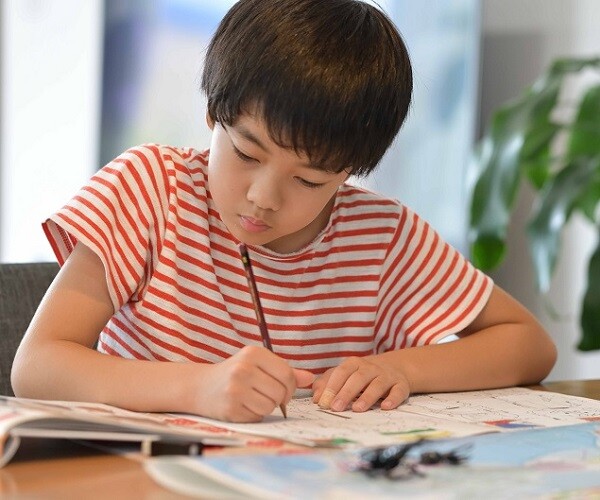

A Strong Sense of Time Management
Self-discipline and awareness in a pressured or complaining environment can unintentionallysection unintentionally create pressure for children. When children feel forced or pressured by adults, learning becomes a burden.
Because learning should be a relaxing and anticipated journey, where children are excited to explore new things. If children are anxious and afraid to learn from the start, their development will be more difficult.
A noticeable trait in children is their strong sense of time. Children often have the ability to plan their studies, from choosing study times to determining what to do in each lesson.
This creates not only initiative but also enables them to develop time management skills. When children implement their study plans, they learn to organize tasks and allocate time reasonably.
In this way, children can think, grow, and become better versions of themselves with true independence. This independence instills responsibility for learning and forms confidence in their abilities. When children realize that they can achieve goals independently, this confidence will lead to greater success in the future.

A strong sense of time management.

Ability to Prioritize Tasks
If you observe carefully, you will easily notice that children who perform well academically often have their own principles in organizing their time and studies. These principles are not just habits but a solid foundation that helps children develop self-management and self-discipline skills in the learning process.
Especially when it comes to “playing before doing homework” or “doing homework before playing”, many children will choose the latter without exception. This decision reflects self-discipline, planning skills, and time management.

Ability to prioritize tasks.
Children understand that completing tasks before rewarding themselves is not just a way to get what they want but also a method to create positive study motivation. These children often have a clear vision of their goals and know how to divide their time reasonably to effectively study and enjoy recreational activities.
When encouraged to follow these principles, children will gradually form the habit of working in an organized manner, considering both studies and play. Over time, the principle of “doing the right thing at the right time” is formed from an early age, along with good habits. This develops self-discipline and lays the foundation for positive habits in the future.
In fact, children who can self-manage their time and tasks will find it easier to cope with academic pressure at higher levels of education. Children will know how to plan for exams, projects, and assignments without feeling overwhelmed.

Ability to Continuously Adjust Their Efforts
Becoming an excellent student is a process that involves multiple experiences and continuous efforts. Children often have to overcome not only academic challenges but also difficulties in daily life, learning from both failures and successes. Every hardship is a valuable lesson, helping children gain experience and develop problem-solving skills.
Efforts and determination will help children overcome barriers and academic challenges, thereby building confidence and belief in their abilities.

Ability to continuously adjust their efforts.
When children realize that their hard work can yield positive results, they will become more confident in challenging themselves with more difficult tasks. This applies to both studies and other aspects of life, from sports to arts or social activities.
In this regard, parents should create a comfortable and positive learning environment, focusing not only on current academic results but also on the child’s development. Encouraging children to set goals and pursue their passions will make them more excited and interested in learning. Parents can discuss with their children what they want to achieve and then build a suitable and engaging study plan.
Regardless of the outcome, it is important to acknowledge the child’s daily progress, from the smallest steps to greater successes.
This will create a solid foundation for long-term development, encouraging children to strive continuously, creating the motivation to dream and explore their potential. When children feel that their efforts are recognized and appreciated, they will be encouraged to strive even harder.
Nurturing Talented and Resilient Children: 3 Types of Admirable Mothers We Should Emulate
Parenting is a challenging yet rewarding journey, and every parent aspires to raise their children to be resilient, capable individuals who can overcome life’s adversities. Nurturing a child’s potential and equipping them with the skills to navigate obstacles is the ultimate goal, fostering their growth into confident and accomplished adults.







































